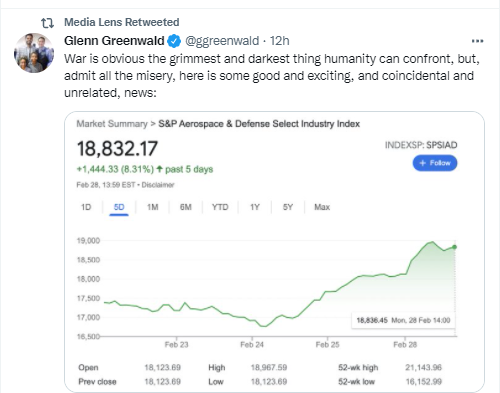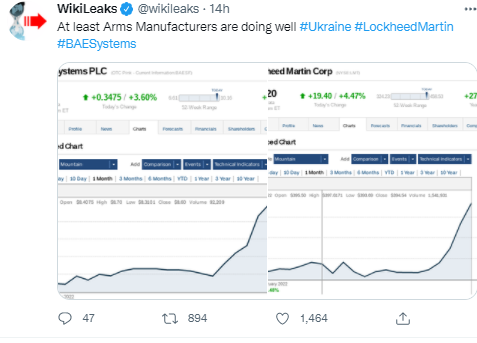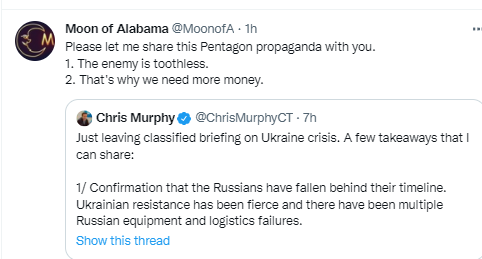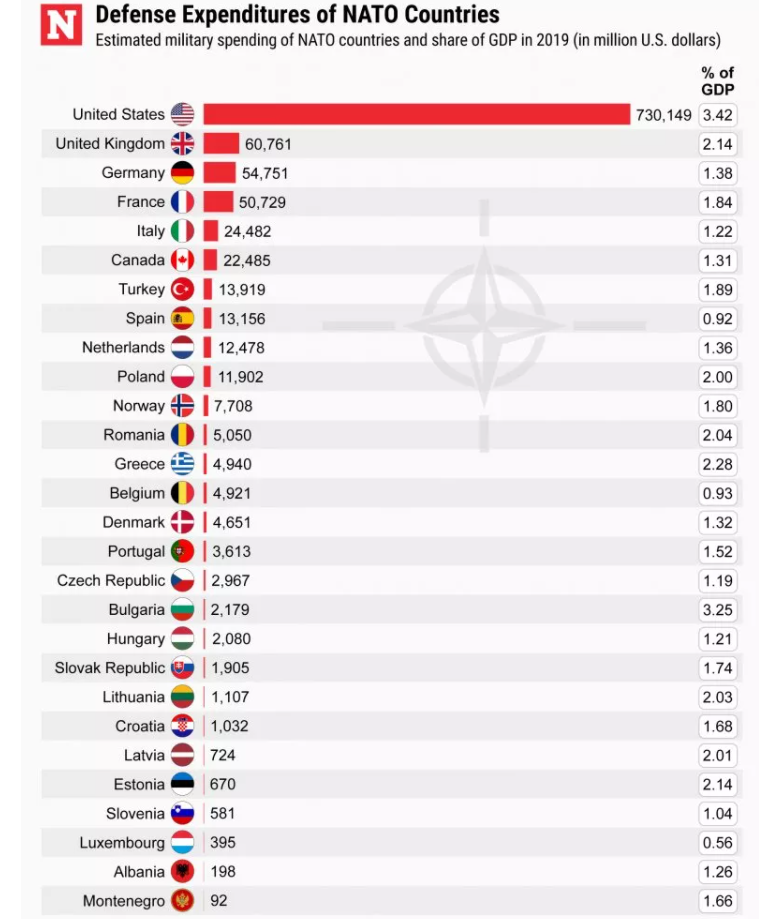The Universal Boosting of Putin 1818
Back in the days when I was one of the British state’s more efficient functionaries, I spoke with British officers who had been in Russia during the Yeltsin period, when they had been able to get up close and effectively inventory the Russian armed forces. (For those who don’t know, I was First Secretary at the British Embassy in Warsaw, I was British Ambassador in Tashkent, and I was taught to be fluent in both Polish and Russian, which included living in St Petersburg as a language student while Ambassador designate).
What we (as I was then a cog in this machine) found was that the strength of the Soviet Union’s Red Army had been massively exaggerated in all our intelligence estimates, on which defence strategy had been based for decades. We had over-estimated the numbers, the mobility and above all the capability of Soviet weapons systems. Much of it was barely functional; the problems with both quality and maintenance were not just the product of the disintegration of the Soviet system, they evidently went back decades.
One interesting thing – and I recall discussing this with a British Brigadier General at the Polish exercise area in Drawsko – was that years of military planning had involved scenarios which revolved around successive defensive lines in Western Europe and eschewed any kind of counter-attacking strategy. That conversation had started because, when the British Army first started exercising on the former Warsaw pact training area at Drawsko, we had to strengthen bridges in Eastern Germany and Western Poland in order to get our tanks there.
We were musing that this had never been considered a problem in cold war strategy, because it was presumed our tanks would never go forward. We now knew they could have, which was interesting the analysts.
The truth, of course, was that it had always been in the interest of MI6, the Defence Intelligence Service, the British armed forces, of their American counterparts, and of all their NATO counterparts, massively to exaggerate the strength of the Red Army. Because the greater the perceived enemy, the more we needed to throw money at MI6, the Defence Intelligence Service, the British armed forces, their American counterparts, and at all their NATO counterparts.
Nothing has changed. Exaggerating the strength of the nominated enemy is still very much in their interest.
It is also, of course, massively in the interest of the arms industry. This is the classic operation of the military industrial complex, which does not just need an enemy, it needs a massive, terrifying, ultra-powerful enemy. Or why would you and I keep feeding the military industrial complex huge sums of money?
We see this operating today. The war profiteers have already made billions from the war in Ukraine. Look at this surge in defence stocks.


The German chancellor has already announced $200 billion of extra defence spending. The market expects to see similar boosts, totalling trillions of dollars across NATO, of money into the arms manufacturers and dealers, as a result of the Russian invasion of Ukraine.
Yet this is an irrational response. What the Russian invasion of Ukraine has actually revealed is the limitations of Russian power. Those limitations consist both of the capacity of its armed forces, and the desire of its people to be a part of European civilisation, not to destroy European civilisation.
You can pretty well stand inside Russia and throw stones into Kharkiv, where Russian is an everyday language (and locals call the place Kharkov), yet Russia has not yet managed to subdue it. Yet we are supposed to be terrified that the mighty Russian army could roll across Western Europe and its tanks could fight their way through Kiev, Warsaw, Berlin, Amsterdam, Brussels, Paris and London? It is plainly an utter nonsense (I address nuclear war later, a quite different proposition).
It says something very interesting about mass psychology that our political and media classes are able to convince the population, both that Russia is an incredible threat to us in our homes, and that the gallant Ukrainians can hold the Russians off. The western political and media class, almost universally, are managing both to crow that Russia is militarily weak, and to claim that we need to throw yet more money at the military industrial complex. As nicely observed by Moon of Alabama.

There are however, even in “respectable” media, a few voices pointing out that what is happening in Ukraine shows NATO defence spending to be already disproportionate. I was very surprised to read this eminently sensible article in Newsweek:
In the longer term, the recognition of Russian military weakness represents a fundamental challenge to U.S. strategy, spending priorities and even its firm hold on the world. It questions Washington’s obsession with a supposed “peer” adversary and the U.S. emphasis on a larger military and ever-increasing defense spending to deal with Russia. Changing the narrative on the Russian military also fundamentally challenges NATO and its European members. Though there might be heightened awareness and even fear of Moscow’s willingness to resort to extreme and even reckless behavior, the reality is that there doesn’t need to be increased defense spending or a renewal of European ground forces….
For Washington, this display of Russian military weakness should be comforting in terms of Moscow’s true military threat to Europe. At the same time though, it exposes the need for a different national security strategy, one that doesn’t imagine Russia as a military equal, and one that doesn’t push Vladimir Putin’s back against a wall.
This war in Ukraine should represent such a moment of epiphany in western political thought.
According to the Russians themselves, Russian military spending is just 5% of NATO military spending. That is about right.

Total NATO spending is over 1 trillion dollars a year. Russian defence spending in 2019 was $65.1 billion a year, just higher than the UK. So nominally Russian spending is a little over 6% of NATO spending a year. Of course, purchasing power in the defence industry makes nominal calculations not entirely helpful. Here is a short link from an excellent discussion from the Stockholm International Peace Research Institute of the factors that might make Russian real resources put into defence greater than the nominal total:
Nonetheless, there are strong indications that military goods and services cost less in Russia than in the USA or most of Europe and, therefore, that Russian military spending has a higher purchasing power. For example, unlike the USA and other large European states, Russia still relies on conscription. In addition, Russian career soldiers have lower salaries: for example, in 2019 a Russian lieutenant colonel received approximately $1330 per month, whereas a (lower-ranked) captain in the British Army received more than $4000 monthly. Adequate data to make a similar comparison of the cost of acquiring military equipment is not available.
Converting Russian military expenditure using GDP-based PPP rates (based on data from the International Monetary Fund) gives spending of $166 billion in 2019 (instead of $65.1 billion using market exchange rates). This is still less than one-quarter of US spending of $732 billion. A similar calculation gives Chinese military spending of over $500 billion (instead of $261 billion using market exchange rates).
I would argue that while paying and feeding troops may be indeed be much cheaper in Russia, military hardware costs are much dependent on metals, processors and other internationally traded commodities and an overall comparison to the simple relative cost of living PPP index for Russia is not appropriate. But even using the general IMF PPP calculator, Russian defence spending is, at the very most, 12% of NATO spending.
The idea that NATO has to spend more to match the threat to NATO of Russia is plainly a nonsense.
So those of us who have always opposed NATO’s militarism, NATO’s involvement in illegal wars and NATO’s massive propaganda operation aimed at boosting the funds fed in to the arms manufacturers, the security services and the military, should welcome the opportunity for growing understanding that a large portion of this defence expenditure is not necessary.
The Russian economy is about the size of the Spanish economy. Russian defence spending is, at the highest, 12% of NATO defence spending. Russia is not the great threat to Western Europe. The limit of Russian power has been shown up in its inability quickly to defeat Ukraine, a militarily third rate European power.
But a large section of the western left – including many regular readers of this blog – is not shouting this out. A section of the western left chooses to boost the propaganda of western arms manufacturers by talking up Russian power, claiming the Russian military is massively capable, putting a good gloss on the performance of the Russian military in Ukraine, and insisting that Putin is a strategic genius.
That “left” narrative is music to the ears of NATO and the military industrial complex. So how has the left been manoeuvred into the position of being the amplifiers of the argument of their natural enemies?
The answer, strangely enough, is not intellectual but emotional.
It is rather lonely being a dissident voice in the West, arguing against the consensus of the media and political elite. Even where that political elite completely screws up, as in the invasion of Iraq, where they launched an illegal war, caused the deaths of millions of people, destroyed the infrastructure of a country, yet still lost the war, there are no deleterious consequences for the political elite.
The International Criminal Court is investigating Russian war crimes in Ukraine. It has done nothing effective about western crimes in Iraq, where hundreds of thousands of civilians died.
This level of injustice is hard to stomach. There is a natural yearning for an alternative, for a good power in the world to match the bad power in the world, and to give at least some hope of justice or balance. Thus many on the left have come to idolise Vladimir Putin as the balance to outweigh and thwart the corrupt, warmongering, neo-imperialist Western states.
Syria gave some comfort to this viewpoint. In the war for hegemony that the West has waged all over the Middle East, the contradictions of allying with a country as anathematical to supposed Western values as Saudi Arabia reached their apotheosis. The American-led West was providing arms, finance and logistical and air support to ISIS and closely allied jihadist groups in an effort to overthrow the Assad regime. The western sponsored civil war had already caused devastation and huge refugee flows. Had the western backed jihadists succeeded, the results would have been unthinkable.
Putin saved the world from that, by a small but timely Russian military intervention, and I for one am glad he did. I say that as absolutely no fan of the Assad regime.
So I can sympathise with those who see Putin as the answer to their desire for the West to be counterbalanced. The problem is it is unrealistic. Russia is just not that strong. It has an economy the size of Spain or another second tier Western European state. Any military intervention by Russia that seriously crosses the West is ultimately dependent on nuclear brinkmanship.
The more fundamental point is that Putin is no more a “good guy” than Western leaders. Russia is a massively kleptocratic state where the gap between the extremely wealthy and the exploited general populace is every bit as big as the gap in the West, and until recently was inarguably much bigger. The human rights situation in Russia is poor. In fact in both those respects, the West is moving increasingly to looking like Russia, which is a very bad thing.
Putin’s Russia is no kind of socialist model.
Putin’s image as the strong man of Eurasia is boosted out of all proportion by those on the right who benefit from portraying a powerful enemy: and by those on the left who yearn for a powerful friend. This is the universal boosting of Putin. But in real life he is a much smaller figure, controlling a waning power of very limited resources. He has just made his largest miscalculation. In the last hour the UN General Assembly has condemned the Russian attack on Ukraine. The UN General Assembly is a forum where the US and its allies can normally muster between 2 and 12 votes. They had 141. Russia mustered 5, the kind of position the US, Israel and the Marshall Islands frequently find themselves in. That is the extent of Putin’s diplomatic blunder.
History teaches us it is a huge mistake to attack Russia. The Russian people have an enormous capacity for wartime resilience when attacked. But the plain truth is NATO has never attacked Russia, and though I intensely dislike NATO’s pushing of weapons systems closer to Russia, NATO doctrine has never included plans to initiate war with Russia.
Just as I have frequently stated Russia has never had any intent to attack the UK; to persuade the population otherwise is the everyday job of the military industrial complex.
But the Russian military industrial complex is just as powerful within Russia as the western military industrial complex is here, and the Russian people are just as exploited by their elites as we are in the West. On either side, the offices of heads of government are not the right place to search for the good guys. Everybody gets lied into war.
It is of course a truism that Russian security concerns were made neuralgic by the ever tightening encroachment of NATO and its missiles. It is a valid point. But it is an equally valid point that NATO has never attacked Russia and none of those missiles has ever been fired at Russia. The point of the missiles was never to fire them at Russia. The point of the missiles was to manufacture and sell them at enormous profit margins and provide large salaries and cash funds for politicians, with endless revolving door jobs for ex-military and civilian defence personnel, who all keep the contracts flowing.
We are now in a position where only a severe Russian military setback can reduce the political momentum for more arms spending, more militarism and more censorship of dissenting opinion in the west – and yet many on the left are hoping for a Russian victory. That despite the fact that not only is Putin’s attack on Ukraine illegal, it is an aggressive war with precisely the same spurious justification as the US-led destruction of Iraq; pre-emptive disarmament to prevent possible attack.
To make matters worse, Putin’s attack is popularly seen as justification of the appalling Russophobia that has formed a fundamental part of the Establishment political narrative in recent years. Putin has appeared to justify years of lies by Russophobes.
I first became fully aware of the untruth of the mainstream Russophobic narrative when it was claimed that Wikileaks had published the Clinton material on the rigging of the primaries against Bernie Sanders, in collaboration with Russia. I knew that was definitely untrue. We then saw an expansion of this narrative, including aspects of the official Skripal story that made no sense whatsoever.
As a result of the invasion of Ukraine, popular opinion holds as validated any lunatic suggestion of evil Russian influence ever to emerge from the disorganised brain of Carole Cadwalladr. “Putin has invaded Ukraine. I told you he fixed the 2016 election” is not a proposition that holds up to a millisecond of logical analysis, but logical analysis is the first casualty of war.
Finally, a couple of thoughts on nuclear weapons. Putin has put his nuclear forces at some kind of initial alert level. In a rational world, this would lead to an increased demand for genuine attempts at nuclear disarmament negotiations, but again I fear that is not in the interest of the elites who control governments. NATO’s insistence on pushing missile systems ever closer to a nuclear-armed Russia and continually ratcheting up Russia’s fear of aggressive encirclement, will make it extremely unlikely that Russia will have any interest in disarmament. Which is so obvious, it proves NATO has absolutely no interest in disarmament either.
I have said much which is highly critical of Russia, and rightly so because Russia had started an illegal war. But that in no way reduces the very large amount of blame that attaches to NATO for its absurd militarism and territorial triumphalism, and the complete lack of interest NATO has shown towards finding a less confrontational approach to Russia.
NATO does not defend the interests of the people of Europe. It embodies the interests of the global elite, who benefit from feeding the military industrial complex. NATO is an instrument of the military and the weapons manufacturers. To exist, it needs an enemy. NATO’s role will always be to secure its own existence and its controllers’ cashflow, by creating enemies.
The only good guys in this are the common people of Ukraine, and the unfortunate conscripts in the Russian army. Let us all pray, hope or think on them tonight.
———————————————
Forgive me for pointing out that my ability to provide this coverage is entirely dependent on your kind voluntary subscriptions which keep this blog going. This post is free for anybody to reproduce or republish, including in translation. You are still very welcome to read without subscribing.
Unlike our adversaries including the Integrity Initiative, the 77th Brigade, Bellingcat, the Atlantic Council and hundreds of other warmongering propaganda operations, this blog has no source of state, corporate or institutional finance whatsoever. It runs entirely on voluntary subscriptions from its readers – many of whom do not necessarily agree with the every article, but welcome the alternative voice, insider information and debate.
Subscriptions to keep this blog going are gratefully received.
Choose subscription amount from dropdown box:
Paypal address for one-off donations: [email protected]
Alternatively by bank transfer or standing order:
Account name
MURRAY CJ
Account number 3 2 1 5 0 9 6 2
Sort code 6 0 – 4 0 – 0 5
IBAN GB98NWBK60400532150962
BIC NWBKGB2L
Bank address Natwest, PO Box 414, 38 Strand, London, WC2H 5JB
Bitcoin: bc1q3sdm60rshynxtvfnkhhqjn83vk3e3nyw78cjx9
Ethereum/ERC-20: 0x764a6054783e86C321Cb8208442477d24834861a
Subscriptions are still preferred to donations as I can’t run the blog without some certainty of future income, but I understand why some people prefer not to commit to that.